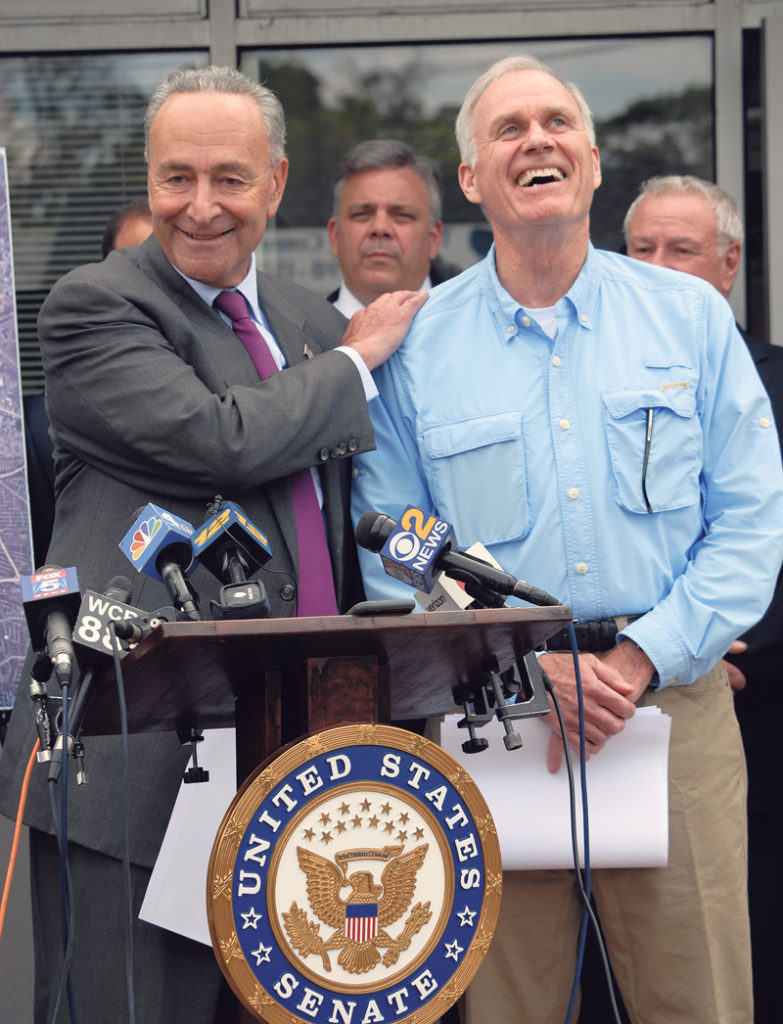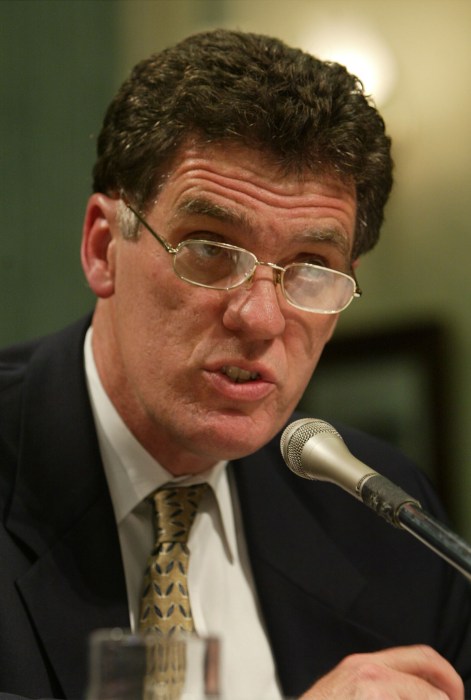
He came. He saw. He…learned?
Senator Chuck Schumer invited Secretary of the Navy Richard Spencer to see firsthand the front lines in the battle against the Grumman-Navy Plume. The former Marine chopper pilot took a tour of the Massapequa Water District facilities with the senator. He also talked with representatives from the Bethpage, Massapequa and South Farmingdale water districts, including respective superintendents Mike Boufis, Stan Carey and Francis Koch.
The plume has been spreading southeast for decades from the former Grumman—and Navy-owned, Grumman-operated—manufacturing facilities in Bethpage. The main contaminant, trichloroethylene (TCE), has been detected at levels above the federal drinking water standard at a monitoring well just north of the Southern State Parkway and west of Route 135 in Seaford.
Bethpage has been the most affected district, and the Navy has spent millions to help the three districts mitigate against the plume.
Nominated by President Trump and sworn in on Aug. 3, Spencer paid a courtesy call on Schumer, who immediately told him, “I got a whole bunch of priorities, but none is more important in my entire state than this plume. We need the Navy to step up to the plate.”
At the press conference, Schumer noted that the plume affects the drinking water for 250,000 people, “and it’s spreading. And if we don’t do remediation it’s going to cost a lot of money. The people in [the affected water districts] didn’t create this mess and they shouldn’t be charged for it.”
As he and Boufis held up aerial pictures overlaid with the boundaries of the plume, Schumer noted how much it had spread since 2003, when the extent of contamination was first diagnosed.
Schumer, a Democrat and minority leader, said he was able to get $323 million for the Navy’s environmental cleanup fund in his chamber’s 2018 budget resolution. He expected to see a similar amount in the House defense budget resolution with help from area congressmen Peter King and Thomas Suozzi. Though the money has to be used across the nation, Schumer said it would definitely help with the plume remediation, since the Navy did not have to hunt around for the money.
“I’m not going to rest until this problem is solved,” Schumer vowed. “Seeing is believing. That’s why I asked the secretary to [visit]. When you’re here, when you talk to these great people on the water boards, you learn about it firsthand.”
Commented Spencer, “The senator hits the nail on the head. Seeing is believing. I’ve been at the helm only six weeks now. It’s a little busy. But coming up here and seeing what was going on with the plume in Bethpage was a priority. The Navy knows its responsibilities.
The Navy isn’t going anywhere. The Navy is part of this community…and we will do what is the right thing to do. We have science on our side. We have technology on our side. And now, with the good work of the senator, we have more resources on our side that will assist us in tackling this issue.”
Boufis called Schumer “a friend of the water industry for many years,” (“And now I’ve brought another friend,” interjected Schumer) and welcomed the visit by the secretary.
“It’s been an honor to meet you and to thank you for giving us the time and the respect to stand behind us in this fight,” Boufis told Spencer, adding that the water districts had mainly been taking on the plume by themselves, joining forces in what he called “an epic battle.”
Spencer acknowledged that it had been a learning curve as he got himself up to date on the plume.
“We understand the plume problem. We understand how it’s all unfolding, and we’re prepared to do what’s right,” Spencer said.
Schumer noted that it had been a struggle to get the responsible parties to own up to the mess they had created, but he expressed confidence about the Navy’s role going forward under Spencer’s leadership.
“Other Navy secretaries have tried to help, but it’s been a slow process,” Schumer said. “Secretary Spencer has been the first one to volunteer to come here, who’s been here and who’s seen the problem. We heard him inside when we discussed it. He has studied the problem and knows it well.”
The senator was confident that the cleanup money would be appropriated, and the best of plume remediation plans would be submitted and approved.
The Navy has its share of contaminated sites around the country, Schumer concluded, “but I don’t know of any who affect as many people and as in a direct way as [the Grumman-Navy plume].”
































